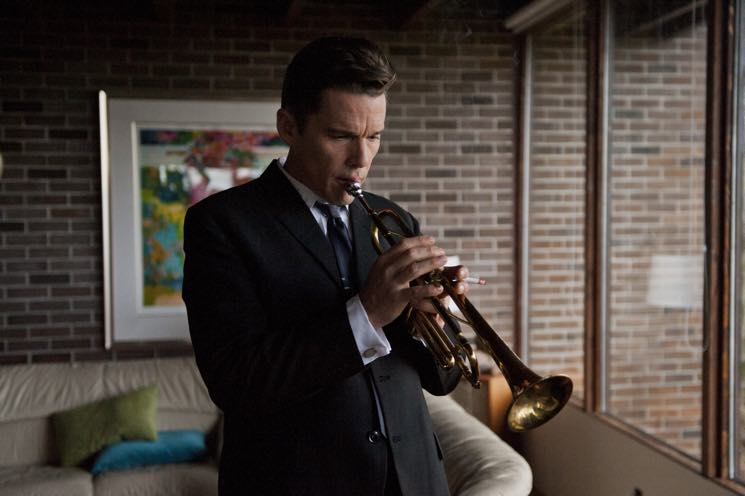"The movie's not trying to be a factually accurate biopic," Ethan Hawke tells me about Born to Be Blue, an exploration of a year in West coast jazz trumpeter Chet Baker's life, in which he almost lost everything. "It's really trying to be a jazz movie about exploring the legend of Chet Baker."
Baker is credited with helping create "cool" jazz — a more laid-back, mellow California style that contrasted with Charlie Parker's frenetic energy or Miles Davis's imagination; Baker also made his name with romantic, softly sung standards like "My Funny Valentine." While not respected as an innovator, his popularity antagonized jazz pioneers like Davis who resented Baker's privileged position. "One time they were playing the same place," Hawke relates, "and Miles wouldn't go on until the Chet Baker 45s were taken out of the jukebox and broken. [Baker] just wanted to be [Davis's] friend. It wasn't lost on him that he wasn't the best trumpeter."
Baker's drive — more passion than talent — is the heart of Born to Be Blue; in 1968, Baker was severely beaten after a gig in a dispute over money, drugs or both, busting his front teeth and ruining his embouchure (the shape of the mouth that enables horn players to play). Already broke and battling severe addiction issues, it would have spelled the end for most, but not Baker. After a misguided attempt to play himself in a movie about his own life, Baker takes up with the actress playing his ex-wife (Selma's Carmen Ejogo) and embarks on a year-long spiritual journey to reconnect with his instrument, his muse and to learn to play again.
Two elements helped Hawke — who's almost never played real people in movies before — crack the Chet Baker nut: developing a relationship with the trumpet, and going down a rabbit hole of YouTube performances and interviews. "If you're playing a cop and you've played five cops, it becomes hard to figure out what's new about this guy. For me, the key was [Baker's] love of music. The physical key was the trumpet — playing with them, putting them together. There are all these little steps that walk you out of your own life and create a specific world. I just took what I wanted and what smelled real to me."
Hawke also found it easy to connect Baker's passion for music and his susceptibility to addition. "If the goal of your life is to play trumpet really well and you feel you play better high, why wouldn't you? The kind of obsessive behavior to practice 20 hours a day is the same kind of thinking that leads to addiction."
Baker is credited with helping create "cool" jazz — a more laid-back, mellow California style that contrasted with Charlie Parker's frenetic energy or Miles Davis's imagination; Baker also made his name with romantic, softly sung standards like "My Funny Valentine." While not respected as an innovator, his popularity antagonized jazz pioneers like Davis who resented Baker's privileged position. "One time they were playing the same place," Hawke relates, "and Miles wouldn't go on until the Chet Baker 45s were taken out of the jukebox and broken. [Baker] just wanted to be [Davis's] friend. It wasn't lost on him that he wasn't the best trumpeter."
Baker's drive — more passion than talent — is the heart of Born to Be Blue; in 1968, Baker was severely beaten after a gig in a dispute over money, drugs or both, busting his front teeth and ruining his embouchure (the shape of the mouth that enables horn players to play). Already broke and battling severe addiction issues, it would have spelled the end for most, but not Baker. After a misguided attempt to play himself in a movie about his own life, Baker takes up with the actress playing his ex-wife (Selma's Carmen Ejogo) and embarks on a year-long spiritual journey to reconnect with his instrument, his muse and to learn to play again.
Two elements helped Hawke — who's almost never played real people in movies before — crack the Chet Baker nut: developing a relationship with the trumpet, and going down a rabbit hole of YouTube performances and interviews. "If you're playing a cop and you've played five cops, it becomes hard to figure out what's new about this guy. For me, the key was [Baker's] love of music. The physical key was the trumpet — playing with them, putting them together. There are all these little steps that walk you out of your own life and create a specific world. I just took what I wanted and what smelled real to me."
Hawke also found it easy to connect Baker's passion for music and his susceptibility to addition. "If the goal of your life is to play trumpet really well and you feel you play better high, why wouldn't you? The kind of obsessive behavior to practice 20 hours a day is the same kind of thinking that leads to addiction."




